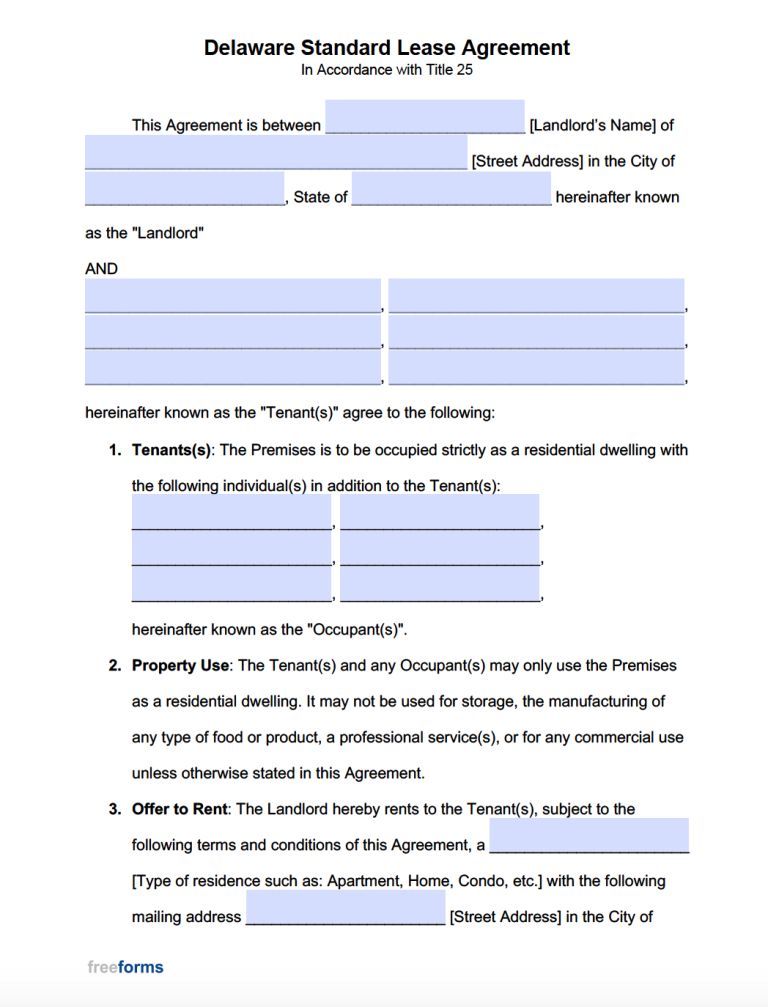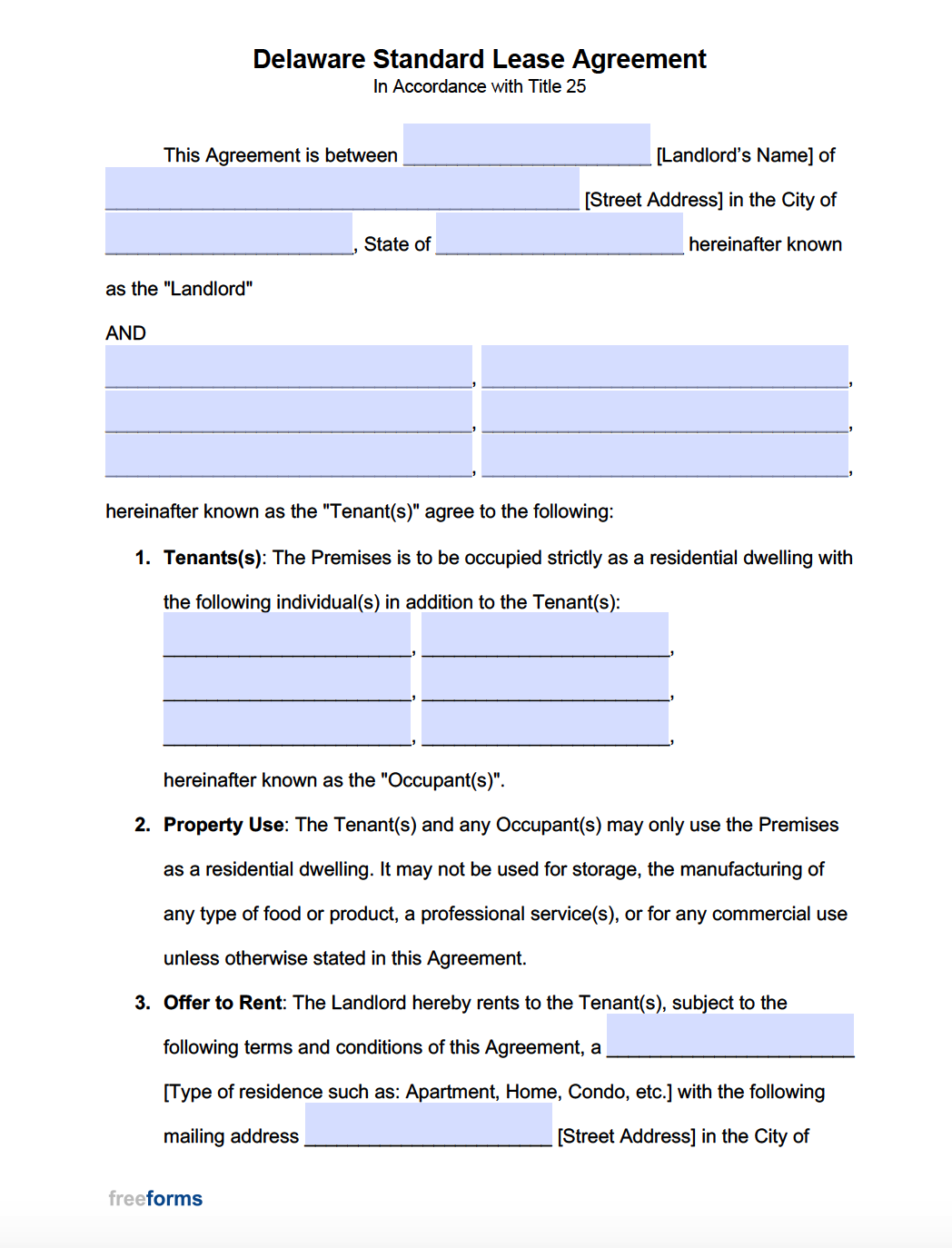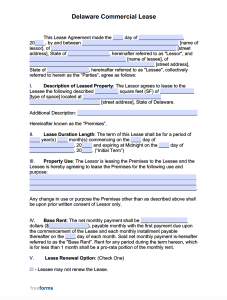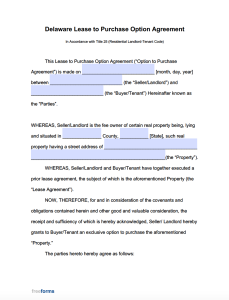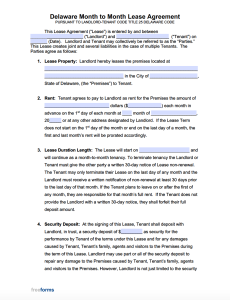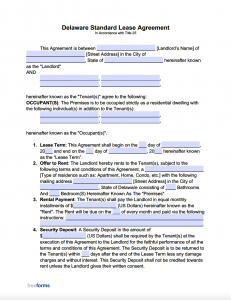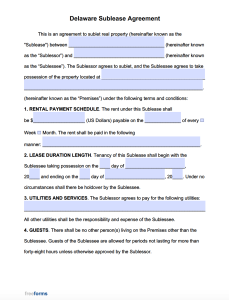Lease Agreements (6)
|
Download: PDF, Word (.docx) |
|
Download: PDF, Word (.docx) |
|
Download: PDF, Word (.docx) |
|
Download: PDF, Word (.docx) |
|
Download: PDF, Word (.docx) |
|
Download: PDF, Word (.docx) |
Required Landlord Disclosures
1.) Bed Bug Disclosure (25 DE Code § 5317); Landlords must inform tenants of a residence’s bedbug status and must disclose if adjacent properties have an infestation accordingly.
2.) Contact Information (25 Del Code § 5105): The landlord or an authorized individual must supply the names and business addresses of themselves and anybody who owns a portion of the property being rented (or formal agents representing the landlord/owner).
3.) Landlord-Tenant Laws (25 DE Code § 5118): Landlords provide the state’s Summary of the Landlord-Tenant Code upon execution.
4.) Lead-Based Paint (42 U.S. Code § 4852d): A required written lead paint disclosure informing tenants pre-1978 structure lead dangers.
5.) Security Deposit (25 Del Code § 5514): The landlord must disclose the escrow account containing the security deposit funds.
When is Rent Due?
Grace Period: Delaware expects rent paid according to the lease or every term; however:
- Late payments do not incur fees for five days after the rent’s due date when there is an in-county address to receive payment.
- Landlords may not impose late fees for unpaid rent until eight days after the due date when there is no consistent in-county address to receive rent (25 Del Code § 5501).
Unpaid: Landlords issue a five-day notice to pay the rent within five days of receipt or the lease terminates accordingly (25 DE Code § 5502).
Late Fees
NSF Fee
Security Deposit Maximum ($)
Security Deposit Return
Returning to Tenant: Landlords return tenant security deposits within 20 days of lease termination (25 DE Code § 5514(e)).
Itemized List: If there are damages to the property that require repair, the landlord must deliver an itemized list to the tenant detailing the reason for each deduction (also within 20 days after the expiration of the contract) (25 DE Code § 5514).
Landlord’s Right to Enter
Absence
Repair and Deduct
Tenants are explicitly given the right to deduct from the rent to repair serious issues under certain conditions:
- The landlord ignores or dismisses a notice to repair for 30 days after its service
- The tenant is up to date in their rent payments
- The repair issue is not the result of the tenant’s actions
- None of the tenant’s guests are at fault for the damage (25 DE Code § 5307).
Delaware allows tenants up to $400 or ½ a month’s rent to complete the repair (whichever is less); however, they must provide receipts for this balance when paying the rent (25 DE Code §5307).
Tenant Breaking a Lease Early
Is an Oral Lease enforceable?
Renewing a Lease
Landlords must give at least 60 days’ notice before updating the terms of the lease to increase rent; however, the tenant may terminate the lease over the increase with 45 days’ notice prior to the end of their current lease term (25 DE Code § 5108).
Unclaimed Property
Whenever landlords are absolutely sure their tenant shall not return, they dispose of the remaining property (25 DE Code § 5507).
Landlords store tenant property for seven days or 24 hours after a successful writ of possession (25 DE Code § 5715).
